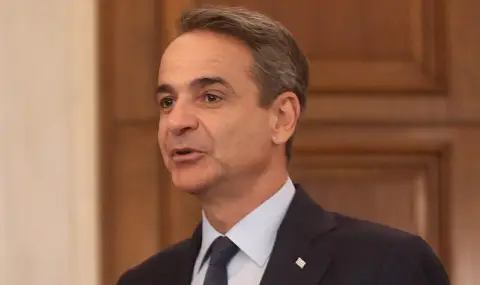Greek Prime Minister Kyriakos Mitsotakis said he expects North Macedonia's authorities to publicly confirm they are abiding by national agreements on their country's name and said, that he will raise the issue at the NATO summit in July.
„I expect the acting Prime Minister of North Macedonia, Talat Xhaferi, to publicly confirm clearly and categorically that he respects the Prespa Agreement and that the name of his country – North Macedonia – erga omnes, to all, is used. Of course, I will raise this issue at the NATO summit and call on the leadership of the neighboring country not to jeopardize its European course, Mitsotakis said during a press conference on the island of Crete dedicated to the upcoming elections for the European Parliament, broadcast by a television channel ERT2.
„They need to understand that the election is over, but populism doesn't stand the test of foreign policy once someone is in power. I believe logic will prevail. For us, the agreement has many negative aspects, but one of its important aspects was one country name for all uses. We will require absolute compliance on this matter. And we are not alone in this. The EU and the US say the same," continued the head of government. The Prime Minister expressed confidence that “in the end, logic will prevail and North Macedonia will return to the difficult path of bringing its legislation in line with European standards, and Greece will be the first to support it”.< /p>
Previously, the prime minister already stated that the new leadership of North Macedonia should change its position and use in all cases only the constitutional name of its country , and until then Greece will not ratify the three memoranda to the Prespa Agreement with North Macedonia on its state name. The Prime Minister noted that the President of North Macedonia Gordana Siljanovska-Davkova and the Secretary General of the party that won the elections “Internal Macedonian Revolutionary Organization– Democratic Party of Macedonian National Unity“ (VMRO-DPMNE) Christian Mickoski uses the old name of the country in his statements – Macedonia, which, according to the Prespa Agreement with Greece, the country changed in 2019 to North Macedonia.
The government of the ruling New Democracy party, which came to power in 2019, has not started ratifying the three memorandums since then, believing that this delay could be a real tool to pressure Skopje to comply with all the provisions of the Prespa agreement. These are memoranda on “Establishing a Coordinating Committee for Economic Cooperation”, “Accelerating the process of accession of North Macedonia to the European Union” and “Patrolling of North Macedonian airspace by Greek military aircraft.“
On May 12, during her inauguration, the President of North Macedonia, Gordana Siljanovska-Davkova, referred to her country simply as Macedonia, which provoked a negative reaction from the Greek Foreign Ministry. In Greece, the use of such a name by a neighboring country is considered, in particular, as a claim to the northern Greek regions - Eastern Macedonia and Thrace, Central Macedonia and Western Macedonia, as well as an illegal appropriation of the history of Greek Ancient Macedonia.
On June 17, 2018, the foreign ministers of Macedonia and Greece signed the Prespa Agreement on the new official name of the former Yugoslav republic - the Republic of North Macedonia - on the shores of Lake Prespa, along which the border between the two countries runs. The ratification by both sides of this document marks the end in 2019 of the 27-year conflict between Athens and Skopje, during which Greece blocked Macedonia's accession to NATO and the EU. North Macedonia became the 30th member of the North Atlantic Treaty Organization on March 27, 2020.
The Prespa Agreement in particular provides for the renaming of state facilities in North Macedonia that are named after historical figures from Ancient Macedonia. Athens and Skopje also held negotiations within the framework of a joint commission on the issues of correct reflection of the history of both countries in textbooks and curricula.
